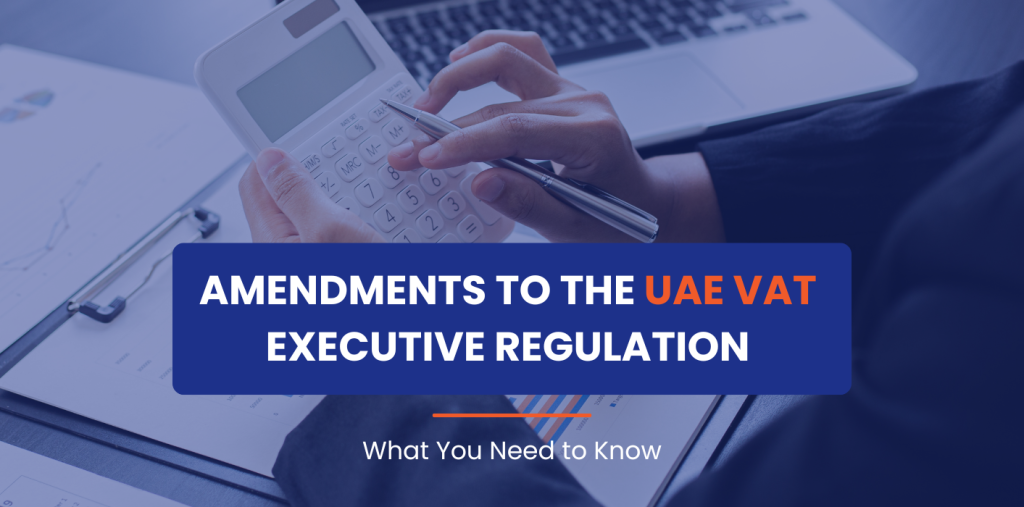In recent years, the United Arab Emirates (UAE) has made significant strides in enhancing its taxation system. The introduction of Value Added Tax (VAT) in 2018 was one of the most pivotal changes, marking a shift away from the UAE’s reliance on oil revenues. Over time, the UAE government has continually refined the VAT system, making periodic amendments to ensure its alignment with international standards and to address the evolving economic landscape.
Here, we will explore the recent amendments to the UAE VAT Executive Regulations and what they mean for businesses operating in the country. These changes provide clarity on specific provisions, streamline compliance procedures, and ensure the VAT system is more efficient and transparent.
Overview of VAT in the UAE
The UAE introduced VAT as part of its broader efforts to diversify its economy. The standard VAT rate is 5%, applicable to most goods and services unless specifically exempted. VAT is designed to be a consumption tax, levied at each stage of the supply chain, with businesses collecting VAT on behalf of the government.
Since its introduction, VAT has been an essential part of the UAE’s fiscal policy. However, the complexities of the tax system, along with its rapid evolution, mean that businesses must stay up to date with the amendments to the VAT Executive Regulations to ensure compliance and optimize operations.
Recent Amendments to the UAE VAT Executive Regulations
The Federal Tax Authority (FTA) periodically updates the VAT Executive Regulations to refine the system, improve compliance, and respond to emerging trends. Here are some of the most significant recent amendments:
1. Clarification on VAT Registration Thresholds
A key amendment is the clarification surrounding VAT registration thresholds. Businesses whose taxable supplies exceed AED 375,000 per annum are required to register for VAT. However, the FTA has now provided additional clarity regarding businesses with fluctuating revenues.
The new guidelines specify that businesses should review their taxable supply turnover over the past 12 months to determine their registration obligations. Furthermore, businesses with taxable supplies between AED 187,500 and AED 375,000 can voluntarily register for VAT.
2. Clarification on Single Composite Supply
A major update involves the treatment of single composite supplies. Under the previous regulations, the concept of a composite supply (where several goods or services are provided together as a single supply) was not always clear. The new regulations clarify the requirements for categorizing a transaction as a composite supply, focusing on ensuring that the supply is considered as one unified offering rather than individual components.
3. VAT on E-Commerce Transactions
E-commerce has rapidly expanded in the UAE, and the VAT regulations have evolved to address this. One of the key amendments involves extending VAT obligations to non-resident suppliers providing digital services to UAE consumers. Previously, digital services from foreign suppliers were often not subject to VAT.
The updated regulations make it clear that VAT must be charged on digital services provided by foreign suppliers to UAE consumers. The threshold for VAT registration for non-resident e-commerce businesses is aligned with the AED 375,000 threshold.
4. Updates to VAT on Bad Debts
Another key update relates to the VAT treatment of bad debts. Under previous regulations, businesses could not claim back VAT on goods or services that were written off as bad debts. However, the recent amendments allow businesses to claim a refund on VAT paid for debts that have been unpaid for more than 6 months, provided certain conditions are met.
5. Changes in VAT Treatment for Real Estate Transactions
Real estate transactions have always been complex in terms of VAT. The recent amendments bring further clarity to how VAT applies to real estate deals, particularly the sale or lease of residential property.
- Sale of residential property: The sale of residential property is generally exempt from VAT, but specific guidelines are provided to define what constitutes residential property and the conditions under which VAT may apply.
- Commercial property: VAT is applicable to commercial property transactions, and businesses involved in these deals can recover VAT on related input costs, provided they meet the necessary conditions.
6. Refunds for VAT on Refundable Deposits
There has been further clarification on the VAT treatment of refundable deposits. In the past, businesses struggled to determine whether VAT should be applied to refundable deposits, particularly when the deposit was refunded after the service or product was returned. The updated regulation confirms that VAT should not be charged on refundable deposits, as long as the deposit is refunded within a reasonable time frame.
7. Simplified VAT Refund Process for Tourists
To enhance the tourism experience in the UAE, the government has streamlined the VAT refund process for tourists. Previously, the refund process was time-consuming and involved complex paperwork. The new amendments introduce a digital platform that allows tourists to apply for VAT refunds online before departure, making the process faster and more efficient.
8. Penalty Provisions and Compliance
The UAE government has also updated the penalty provisions in response to the increasing complexity of VAT regulations. Businesses now face stricter penalties for non-compliance, including for late VAT payments and incorrect filings. The amendment emphasizes the importance of voluntary disclosure and corrective actions to mitigate penalties.
How Stratrich Can Help You Navigate VAT Amendments
These amendments to the UAE VAT Executive Regulations present both opportunities and challenges for businesses operating in the UAE. Staying compliant with the evolving VAT regulations can be complex, especially with changes surrounding VAT registration thresholds, real estate transactions, and the treatment of bad debts.
At Stratrich, we specialize in providing comprehensive business setup services in Dubai, UAE that ensure your business complies with the latest VAT regulations. Whether you’re just starting your business in the UAE or need help adjusting to the new VAT amendments, our expert team can guide you through every step.
Here’s how our services can help:
- VAT Registration and Compliance: We assist businesses with VAT registration, ensuring they meet the required thresholds and remain compliant with the updated regulations. We’ll also help you navigate voluntary VAT registration options, such as those available to businesses with taxable supplies between AED 187,500 and AED 375,000.
- VAT Advisory and Tax Planning: Our team provides ongoing advisory services, helping businesses understand how to apply VAT correctly in light of recent changes—whether it’s related to e-commerce transactions, real estate deals, or handling refundable deposits.
- Document Preparation and Filing: We offer assistance in preparing all the necessary documentation for VAT filings, bad debt claims, and VAT refunds, ensuring that your business is always up to date with the Federal Tax Authority (FTA) requirements.
Conclusion
The recent amendments to the UAE VAT Executive Regulations reflect the government’s ongoing commitment to improving the tax system and ensuring it remains in line with international standards. Key changes, such as the clarification of composite supplies, updates to VAT on e-commerce transactions, and the introduction of a simplified VAT refund process for tourists, are designed to make compliance easier and more straightforward for businesses.
For businesses in the UAE, staying informed and up to date with these changes is essential. The amendments provide clearer guidance on VAT treatment for different sectors, including real estate, e-commerce, and bad debts, helping businesses navigate the complexities of VAT while avoiding penalties.
As the VAT landscape continues to evolve, it is important for businesses to stay proactive and engage with the Federal Tax Authority (FTA) to ensure they remain compliant and optimize their tax position. By understanding and implementing these amendments, businesses can help facilitate the UAE’s broader economic growth and ensure they are well-positioned in a rapidly changing tax environment.








